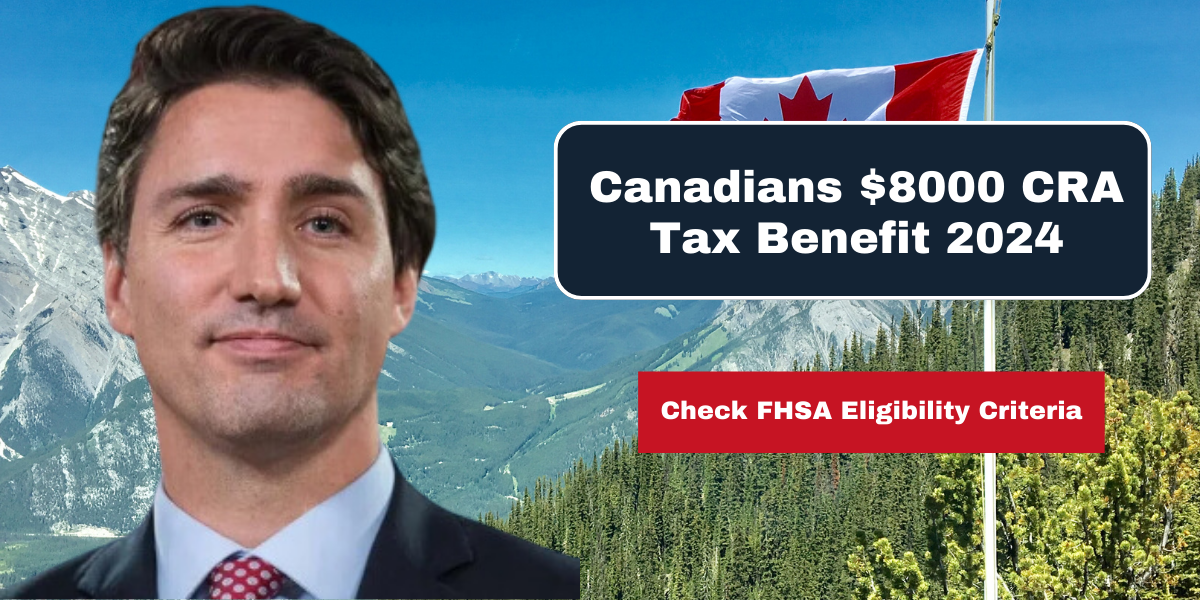The Canadian Revenue Agency (CRA) established the First-Time Home Buyer Incentive (FTHBI) by 2023 to reduce the monthly mortgage payment for first-time homeowners, thus aiding them to enter the market for housing.
Canadians with no home that they own are able to receive a loan from the First-Time House Purchaser Savings Account (FHSA) for a period of fifteen years. You will have until the end of this time frame to take part in the bond market, stock market and Exchange-traded funds (ETFs) from up to 8 thousand dollars within your FHSA.
The benefit that comes with the FHSA donation is the fact that when it comes to Tax time 2024, it is possible that you may be qualified to receive tax credits. To cut down on time and get the most tax advantages in the upcoming year, you must complete your FHSA prior to the close of the current calendar year.
Table of Contents
Canadians $8000 CRA Tax Benefit 2024
Have you missed you missed the first-time homebuyers’ Incentive Account (FHSA) date for investing passed by? Do not worry, the eight grand that you didn’t make use of in 2023 will carry on into 2024, giving you a total of eight grand in the your new contributions space.
This year, you’re permitted to invest at a maximum of $16,000. Do not be worried about the yearly limitation as the FHSA offers you 15 years of time to save as much as forty-thousand dollars. Additionally, with an amount of $8,000 in the contribution allowance each year for the next five years, you’ll have ample time to think about how you can make the most of the FHSA to its fullest potential to help you achieve your dream of owning a home.
| $1600 July Stimulus Checks |
| $300 Child Tax Credit Update 2024 |
| $2000 Child Tax Credit 2024 |
| $120 Snap Ebt Payment |
| Snap $1500 Direct Deposit |
| Stimulus Check |
Overview of Canadians $8000 CRA Tax Benefit
| Organization | Canada Revenue Agency (CRA) |
| Administered by | Government of Canada |
| Payment Mode | Online |
| Category | Government Aid |
| Official Website | https://canada.ca/ |
What is the $8000 CRA Tax Benefit 2024?
In the context of the first-time home buyer Incentive that aids Canadians who are attempting to enter the market in the very first place, there’s an tax benefit of $8000 for CRA. This perk gives tax breaks on the funds that are deposited in an FHSA or FHSA, or First-Time Home Buyer Savings Fund.
People who have not purchased an apartment in the past five years and who are between the between the ages of 18 and 70 can make a contribution of up to $8,000 each calendar year into their FHSA. In addition to getting tax benefits on contributions for the tax year 2024. year, these funds can later be invested in equities bonds, ETFs. (ETFs).
Qualifications Required
You must satisfy the following conditions to be eligible to receive these benefits:
| Eligibility Criteria | Requirements |
|---|---|
| Canadian citizenship | At least 18 years old and a citizen of Canada |
| Potential homeowners | No home ownership within the last five years |
| No prior withdrawals from FHSA for other purposes | Not a first-time homeowner and no prior non-eligible withdrawals |
These criteria outline the requirements for eligibility regarding citizenship, homeownership history, and previous withdrawals from a First-time Homebuyer’s Savings Account (FHSA).
In what way are you willing to give? and how much are in a position to save?
It is recommended to take into account the contribution limitations as well as the potential savings in relation in the First Home Savings Account (FHSA) provided through Canada Revenue Agency. Canada Revenue Agency.
The Limits of Contributions
A year-long
You are able to contribute to your FHSA that amount to $8000 in CRA Tax Benefit. Any donations greater than the threshold cannot be claimed as any tax deduction, and are not qualified to receive the match from the government.
Permanently
The maximum contribution is $40,000 you are allowed to put into your FHSA throughout your life. You can choose to contributing for five years at the maximum sum ($8,000 annually) or divide them over longer durations.
Possible Cost Reductions
Candidates who are seeking get the tax benefit of $8000 must satisfy a variety of conditions:
It is necessary to meet the requirements of being a Canadian citizen or a resident of Canada between the between the ages of 18-71. Our wide age bracket ensures that we can assist many potential home buyers, from those who are young to those near retirement.
First-Time Home Buyers This offer is intended specifically for buyers who are first-time home buyers. This means that you must have bought a home within the last five years before committing towards an FHSA. This requirement is in place to ensure that aid is directed to people who are only getting started in real estate.
FHSA contributions are eligible to receive tax benefits it is necessary to fund your First-time Home Buyer Savings account. There’s a little flexibility when it comes to the annual contribution which is ranging from $8,000 to $1,500. There is no minimum amount, however, which means that people can contribute whatever they are able to pay for.
For non-qualifying withdrawals to be eligible, applicants have to have taken money out of an FHSA previously for any other purpose than purchasing a home that is qualified. This is a requirement that ensures that savings and the tax benefits that follow will can be used to assist Canadians when they purchase their first home.
Estimating your savings potential
When calculating the answer to “How much can you save?”, many factors are taken into account, such as taxes, contribution type, and anticipated investment returns. Whatever the case, this is an approximate estimate:
Hypothesis 1. You could receive an amount of $40,000 in contributions and pay only $10,000 in tax ($2,000 each year divided by 5 years) If you contribute an amount of $8,000 per year over five years, and assume an annual 25 percent tax bracket and you do not earn dividends from the investments.
2. Speculation 2. If you choose to use the maximum lifetime contribution limit of $40,000 limit and receive the maximum match of $10,000 provided by government officials, you could save $50,000. The amount you save on taxes will vary dependent on your tax rate as well as the method you divide your contributions over the course of time.
Additional tips to take into consideration
It could be possible to roll forward any unutilized contribution capacity from previous years, you could contribute more than the maximum annual contribution of $8,000 per year. But be cautious that using funds through an FHSA to purchase a home may need you to adhere to certain regulations and timeframes pertaining to the process. Furthermore, the withdrawal of funds could cause tax consequences; when withdrawing money it is advised to do a thorough investigation first.
Important Dates and Deadlines to Consider
When using your FHSA If you are using your FHSA, here is a quick summary of the important dates you must remember:
Contributions expenses
Annual: You are able to make contributions up to $8,000 each year. However it is essential to remember that contributions made within the first 60 days of the calendar year cannot be deducted from the earnings from the previous year.
The maximum amount you can be contributed over the course of your lifetime is forty thousand dollars.
The deadlines for money to be utilized
When you want to buy a home in Canada You have until the 71st day of your birthday to use the money that you receive from the FHSA to purchase a property that is in compliance with the rules. If this doesn’t happen and you are not satisfied, the remaining funds is transferred into your RRSP.
The deadline for withdrawals is the day you’ve purchased a home there is a period of twelve months within which you can withdraw cash for expenses that you are able to afford for the purchase, including the down payment or closing fees. Then, the cash that is taken is tax-exempt.
Additional important dates
This is the date that will be the day that FHSA program will officially begin operation on April 1.
Deadlines for filing tax returns If you file your annual tax return, make sure you don’t overlook to take advantage of the deduction is yours on contributions for your FHSA.
| 1000 Child Tax Credit Payment |
| Va Disability Payment Dates 2024 |
| Form 1120 |
| 2024 Gas Stimulus Checks |
| Irs Direct File 2024 |
Examining your contribution plan and the investment options in your FHSA frequently is a crucial aspect of planning your finances. This will help ensure that you’re making progress towards becoming homeowner.
Steps to Open an FHSA in Canada
- Check if you are eligible to apply for the FHSA before beginning your application.
- Choose a financial institution, such as a bank trust company, credit union or insurance company offering FHSAs.
- Check out the costs, services and investment options that different issuers offer to find the right fit to meet your financial goals.
- Gather the necessary documents, such as documents proving your Social Insurance Number (SIN) as well as the proof of your birth date.
- Please provide the information required as well as any additional documents required by the issuer you choose to determine your admissibility.
- Follow the process of the issuer to make sure you have opened your FHSA completely.
- You can designate an individual beneficiary to receive the balance of your account in the event in the event of your death, which will ensure that your savings are transferred in accordance with your preferences.
- Begin contributing, as much as $8,000 annually into your FHSA to maximize the savings potential.
- Utilize Schedule 15 to record all your FHSA contributions and other activities on your tax return even if there were no contributions made during the year.
- Set up an auto-directed FHSA to help you manage your investment.
- Check regularly and make adjustments to your choices for investment and contribution strategy in order to increase savings and growth.






